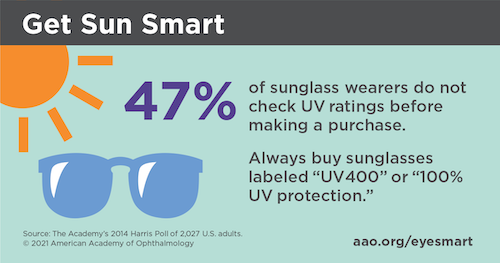When most people think of UV protection, they think of their skin and sunscreen. Did you know that long-term exposure to bright sunlight may also increase your risk of eye disease?
July is UV Safety Month, and Texas Retina, along with the American Academy of Ophthalmology, is reminding everyone about the importance of using 100% UV-blocking sunglasses to help protect your eyes from the sun’s harmful rays. You can also add a broad-brimmed hat to achieve even better protection!
Here are seven common myths you should know about sunglasses and your eye health:
Myth #1: You only need sunglasses on sunny days.
False. UV rays can travel through both clouds and haze. In addition, sun exposure anytime of the year can increase the risk of developing cataracts, growths on the eye and cancer. Sun can also reflect off of ice and snow, causing a painful eye condition called photokeratitis which is more commonly referred to as “snow blindness.”
Myth #2: Babies and children don’t need to wear sunglasses.
False. The sun’s harmful rays are just as dangerous for children as adults. Instill healthy habits early.
Myth #3: Cheap sunglasses don’t offer protection.
False. Sunglasses don’t have to be expensive to protect your eyes. As long as they are marked as “100 percent UV-blocking,” they can be effective. Common labels that indicate proper protection include: “100 percent protection from UVA/UVB radiation” and “100 percent UV 400 protection.”
Myth #4: The size of your sunglasses doesn’t matter.
False. The greater the coverage a pair of sunglasses provides, the better the protection. Look for oversized sunglasses or wraparound styles which offer the best protection from the sun’s damaging rays.
Myth #5: Polarized lenses offer more protection from the sun.
False. Polarized lenses can help cut down on glare reflecting off water, pavement or cars, but they do not block more radiation.
Myth #6: Darker lenses better protect your eyes.
False. The darkness of the lens is not important. What is important is that the label on the lens says “100% UV-blocking.”
Myth #7: Tinted lenses offer more sun protection.
False. Lenses tinted amber, green or grey can offer increased contrast if you are playing sports like baseball or softball, but they do not block more of the sun’s harmful rays.
All of the physicians at Texas Retina encourage you to protect your eyes from the sun as you enjoy the rest of summer!


